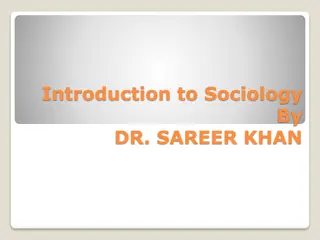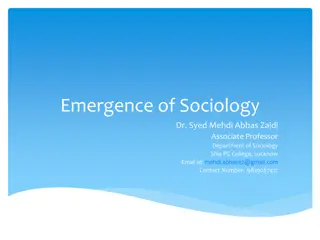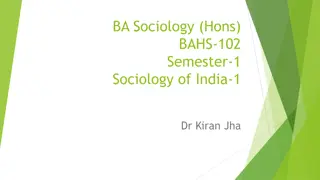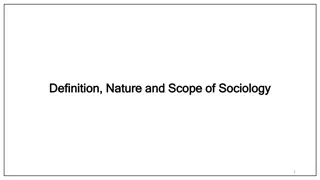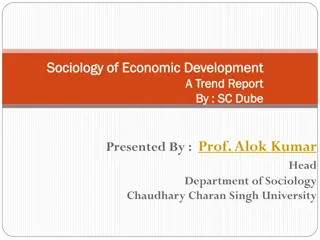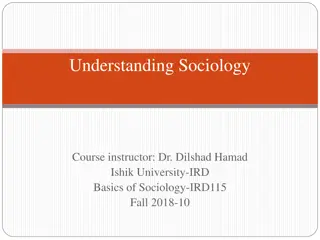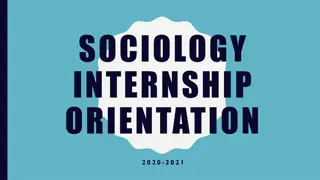Understanding the Origins and Development of Sociology
Sociology, as the science of society, emerged in the 19th century in Europe due to factors like the Industrial Revolution and successes in physical sciences. Influential early sociologists like Auguste Comte and Herbert Spencer contributed to the foundational theories of sociology. Emile Durkheim further solidified sociology as a scientific discipline. This social science explores human relationships and societal structures, aiming to understand and analyze the complexities of human interaction and collective behavior.
Download Presentation

Please find below an Image/Link to download the presentation.
The content on the website is provided AS IS for your information and personal use only. It may not be sold, licensed, or shared on other websites without obtaining consent from the author. Download presentation by click this link. If you encounter any issues during the download, it is possible that the publisher has removed the file from their server.
E N D
Presentation Transcript
SOCIOLOGY AND NATURE OF SOCIOLOGY
SOCIOLOGY Sociology is the youngest of the social science. Its major concern is society, and hence to is popularly known as the Science of Society . Etymological, the term sociological is the combination of two words. One Latin words- Societus and other Greek words-logos , in which Societus means society and logos means study or Science. In this way etymological meaning of Sociology is the Study of the Society or Science of the Society.
Definition Different Scholars have defined Sociology in different ways. Though the content of definition is the same, definitions very from person to person. Sociology is a science of Society. L.F Ward MacIver and Page Sociology is about Social relationship, the net of relationship, we call Society M . Ginsberg Sociology is the Study of human interaction and interrelation, their conditions and consequence Young Sociology is the scientific study of the structure of social life R.E. Park and F.W. Burgess, Sociology is the science of collective behaviour. J. F. Cuber Sociology may be defined as a body of scientific knowledge about human relationships,
HOW DID SOCIOLOGY BEGIN Sociology emerged in middle of nineteen century in Europe Three factors that led to development of sociology Industrial Revolution Travel Success of physical sciences Auguste Comte in France coined the word 'sociology' in his Book Positive Philosophy published in 1838.Earlier it was named Social Physics. He believed that a science of sociology should be based on systematic observation and classification not on authority and speculation. This was a relatively new idea at that time. Herbert Spencer in England published his Principles of Sociology in 1876. He applied the theory of organic evolution to human society and developed a grand theory of social evolution.
Early Sociologists Auguste Comte(1798-1857) Known as father of sociology Auguste Comte argued that the methods used in physics should be used for the study of society. Such a study would reveal the laws of evolution and the laws of the functioning of society. Once this knowledge was available, we would be able to build society scientifically. Thus, the programmes of social reconstruction should follow a scientific understanding of society. Comte identified three stages of human society: Theological, Metaphysical and Positivism Herbert Spencer (1820-1903) Spencer viewed that societies evolve in the same manner as living organisms. As generations pass, the most capable members of a society survive, while the less capable die out. Thus, overtime societies become more differentiated and complex. Spencer's views of the evolution of societies are known as social Darwinism.
Emile Dukhiem (1858-1917) The credit for developing sociology as an independent discipline and science also goes to Emile Durkheim . To him, sociology, to be scientific must study social facts . Social Fact is exterior to human mind and but it has constraints on human behavior Emile Durkheim gave the most notable early demonstration of scientific methodology in sociology. Max Weber (1864-1920) Weber is of the view that Sociology should focus on studying social action of individuals and the method used should be different from the natural sciences. Social action, according to Weber should be studied subjectively emphasizing the uniqueness of each society. Karl Marx (1818-1883) Marx emphasized the role of historical factors in conditioning the behavior of human beings. Marx believed that conflict was the initiator of social change. Therefore, he has given central importance to the concept of conflict
Development of Sociology In India The growth of sociology in India can be divided into three phases. First phase, covering the period from 1769 to 1900, the foundation of sociology was laid down. 1769 to 1900 The British believed that it was important to understand Indian society for smooth governance. They drew on various sources like classical Sanskrit literature to understand the Indian way of life. They carried out the first census of India in 1871. Sociology became a profession, a university subject, during the second phase, from 1901 to 1950. This phase coincided with the professional development of Sociology in India.And anthropologists like Rivers and Radcliffe-Brown from Europe started working in India. This was also the time when Sociology was introduced in the Universities in India. Early Indian sociologists like GS Ghurye were trained in the West
. After 1947 The third phase, beginning after India's independence, was marked by programmes of planned development, increased interaction of Indian sociologists with their foreign counterparts, availability of money for research, and intensification of research and publications There was sharp rise in the popularity of the discipline in India. More teaching and research positions were created, as sociology and social anthropology become university subjects and more and more of their departments were opened up. With the era of planned development the need to know about Indian society increased. Village studies began in India after the independence especially because of the collaboration of Indian sociologists with their American counterparts. In addition, several Indian communities, both tribes and castes, were also intensively studied.
Nature of Sociology Sociology is a science. A sciences which helps to understand the society. So, it has its own characteristics. They are as follows: Sociology is an independent Science Sociology is a social science, not a physical science (it studies human beings, the social behavior, social activities as well as social life.) Sociology is the pure science, not an applied science. (Sociology is a subject where there are no practical works. Sociology observes then society in a theoretical way but not in practical way) Sociology is abstract science, not concrete one. Sociology is all about generalizing, not particularizing or individualizing. Sociology is a categorical or positive science not a normative one. (It concerns with what is like but does not concern with what should be or what ought to be.) Sociology is both rational and empirical science. (it is both dynamic with relations and the theories and observation, experimentation)











